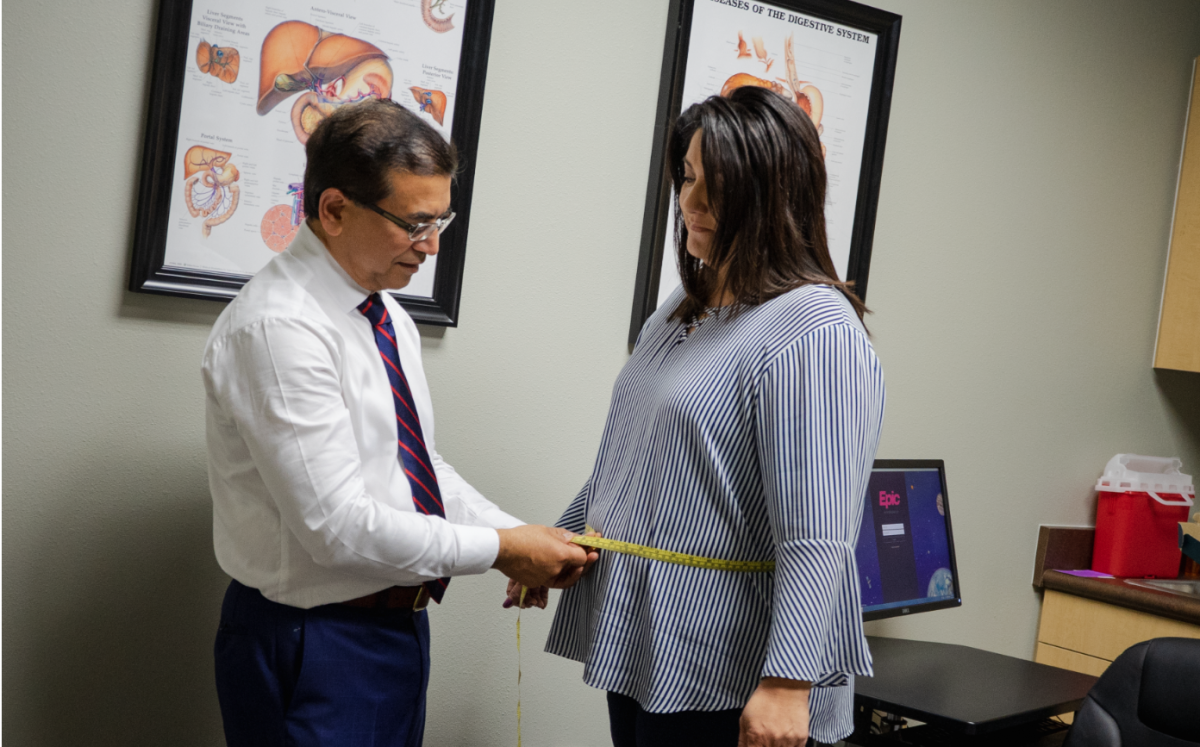
Contributed. Dr. Muhammad Sheikh examines a patient. Sheikh is a leading researcher in the fight against fatty liver disease in the Valley.
Written by
A clinic in Fresno may hold an important key in battling one of the San Joaquin Valley’s greatest health issues.
At the Fresno Clinical Research Center, Dr. Muhammad Sheikh has been conducting research and clinical trials for patients suffering from fatty liver disease and nonalcoholic steatohepatitis (NASH). A native of Pakistan, Dr. Sheikh began his research 20 years ago at the UC Irvine Medical Center. In 2004, he was invited to UCSF Fresno to start a gastroenterology department.
According to Dr. Sheikh, NASH brought on by fatty liver will be the No. 1 cause of liver disease and transplants by 2020, and has reached alarming levels in the Valley.
“I would say it is an epidemic proportion,” Sheikh said. “Critically in Fresno, we have 40 percent Hispanics and we have a huge Hispanic population actually coming from distances like Tulare County, Kern County and different counties to me just for research options.”
Nonalcoholic fatty liver disease is the buildup of fat in a patient’s liver. This can subsequently lead to inflammation and cell death. The body will then create scar tissue to replace the cells. This accumulation of scarring is NASH, which can result in cirrhosis. Fatty liver frequently comes as a result of a high-fat, carbohydrate-rich diet, and patients with diabetes are at an increased risk.
According to National Center for Health Statistics data from 2015-16, 47 percent of Hispanics are obese. Dr. Sheikh added that this has been exacerbated in the Valley by not only genetic factors, but by poor education on health.
Currently, there is no treatment for fatty liver or NASH approved by the Food and Drug Administration. However, the epidemic levels of the disease in the Valley, and the high population of America’s most vulnerable demographic, have meant that the region is the prime location to test the latest treatment methods and pharmaceutical solutions to the problem. This begins with lifestyle modifications, dietary challenges and weight management.
Alongside lifestyle modifications, qualifying patients are placed in clinical trials. Companies like Gilead Sciences, Inc., Allergan, plc., Intercept Pharmaceuticals and Genefit SA are all working on developing treatments for liver scar tissue reduction and currently, Dr. Sheikh has approximately 160 enrolled in trials for these medications. According to Sheikh, 70 percent of his patients are either taking a full or half dose of the pills, while another 30 percent are on placebos. The blind trials mean that neither the patient, nor Dr. Sheikh, know which patients are taking what, if anything at all.
These trials are further aided financially by free lab work and treatment, along with stipends for travel expenses. Fresno Clinical Research Center is the only facility between Los Angeles and Sacramento doing trials of this scope, and Dr. Sheikh said their efforts have been paying off.
“We are seeing some differences in certain patients,” he said. “The scarring is being reduced in certain patients, indicating that the drugs are perhaps working.”
For Sedelia Sanchez of Visalia, these treatments have been life changing and lifesaving. She was diagnosed with stage two liver fibrosis three years ago. Things were brought home even more for her that same day when her cousin died from NASH.
“I called my uncle that day to talk about my cousin and find out what they actually found out,” Sanchez said. “Because I knew I was driving to see a doctor about my liver, and when he explained to me it was because of [my counsin’s] liver, it was an eye-opening experience.”
After being diagnosed, Dr. Sheikh put her on a prescription. When she started having severe bouts of itching, they determined that she was most likely not taking a placebo. However, the biggest indicator that she was on a full or half dose is that by taking the pills – coupled with a change in diet and lifestyle – her scarring began to recede. Now with minimal fibrosis, Sanchez still has five years to go on the program. She said she is looking forward to the day when the fibrosis is gone.
In the meantime, the 47-year-old mother of two is enjoying a healthier and more fulfilling life.
“I’m definitely sick less often,” she said. “I haven’t called in sick – except for my procedures for the liver biopsy – I haven’t called in sick in the last two years. And that says a lot from before.”








